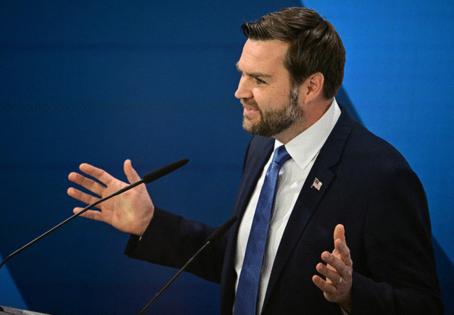David Mills: JD Vance, the 13th century Trumpian thinker
Published in Op Eds
The vice president could be leading a movement to Make America Think Again, or he could be leading a movement to make part of America think it's thinking when it's doing what it always wanted to do.
I hope for the first, but I'm afraid I think the second.
Vance thinks
JD Vance thinks about things, or did, in a way rare for American politicians, who are better with slogans and catchphrases than ideas. They say things to explain what they want and why they want it, but rarely are those words actual ideas.
They don't do something, think, that might make them do something other than what they want to do. You don't rise very high in American politics by having doubts, by seeing the other side's reasonable reasons for thinking differently, by being truly willing to change your mind.
I know people who knew Vance years ago, and they say he thought seriously about the world even as he was rapidly rising in it. Rising and thinking, unfortunately, tend not to go well together.
Whatever one thinks about his book "Hillbilly Elegy," published just eight years ago, he'd thought about the world in which he grew up, about culture, about how people change and why they don't. Readers could engage his claims and arguments with the sense that he'd be able to engage their criticisms in return.
He still speaks, to some extent, as if he were the man who wrote the book. Speaking to Fox News, trying to explain Trump's devastation of foreign aid, Vance said, "There's this old-school concept — and I think a very Christian concept, by the way — that you love your family, and then you love your neighbor, and then you love your community, and then you love your fellow citizens in your own country, and then, after that you can focus and prioritize the rest of the world."
He goes on to claim "the far left" loves people in other countries but not Americans, because a Trumpian always has to have an enemy, and of the worst sort. He praised Donald Trump, because a Trumpian always has to praise Donald Trump, for having the "simple concept, America First ... that puts the interests of American citizens first." He said that it "doesn't mean that you hate anybody else."
The order of love
Then, arguing with an English politician who'd mentioned the parable of the Good Samaritan as a rebuttal, he wrote in an X post: "just google ordo amoris."
He explained: "The idea that there isn't a hierarchy of obligations violates basic common sense. Does Rory really think his moral duties to his own children are the same as his duties to a stranger who lives thousands of miles away? Does anyone?"
"Ordo Amoris" means the order of love, order in the sense of sequence or priority. We can only do so much for others and have to rank them. I have to appreciate a politician who introduces into public discussion a concept worked out in great and sophisticated detail in the 13th century.
It helps answer a basic question that almost no one ever asks clearly in all our debates about government spending. That is: Who do we give money to and why and in particular how do we apportion our limited resources?
Who has the greater demands on us and how much of that demand should we satisfy when others also have demands on us, if lesser ones? What do we do when Americans have so much and so many people in the world need so much just to live?
I read a lot of political writing, and have for decades, and remember few politicians and few columnists and observers even asking this question, much less having an answer.
It's a necessary debate we don't have. Everyone asserts that this group needs help and should get help, and that group and that group and that group too. They will argue with others about which groups need help more, but only in terms of their need, not their relation to the nation that supplies it.
Avoiding the question of the priority of our care is made easier by our apparently universal assumption that we have all the money we need to do whatever we want. But we don't. We have to think about who we help.
Vance's limits
At least Vance noted the problem and offered an answer. Unfortunately, he does not act by, does not think through, the ordo amoris he invokes against people with a more expansive view of caring for others than his and Trump's.
It's not, as he implies, about limiting our charity. It doesn't mean America First, which really means America Only. It's about beginning with those close to us and increasing the number of people we treat as if they were close to us — to see that as human beings in need, they are.
JD Vance failed a simple test case. Whatever one thinks of foreign aid, to stop it immediately and without warning, breaking an implicit promise and leaving vulnerable people even more vulnerable, was an injustice. The same applies to the federal programs that help people.
The ordo amoris, properly understood, requires that we don't just drop those for whom we've taken responsibility, to whom we've given a place in the order of love. Vance was, of course, silent about that. He's not thinking, not well enough, but giving the appearance of thinking to doing what his movement always wanted to do.
____
David Mills is the deputy editorial page editor and a columnist for the Pittsburgh Post-Gazette.
———
©2025 PG Publishing Co. Visit at post-gazette.com. Distributed by Tribune Content Agency, LLC.




























































Comments